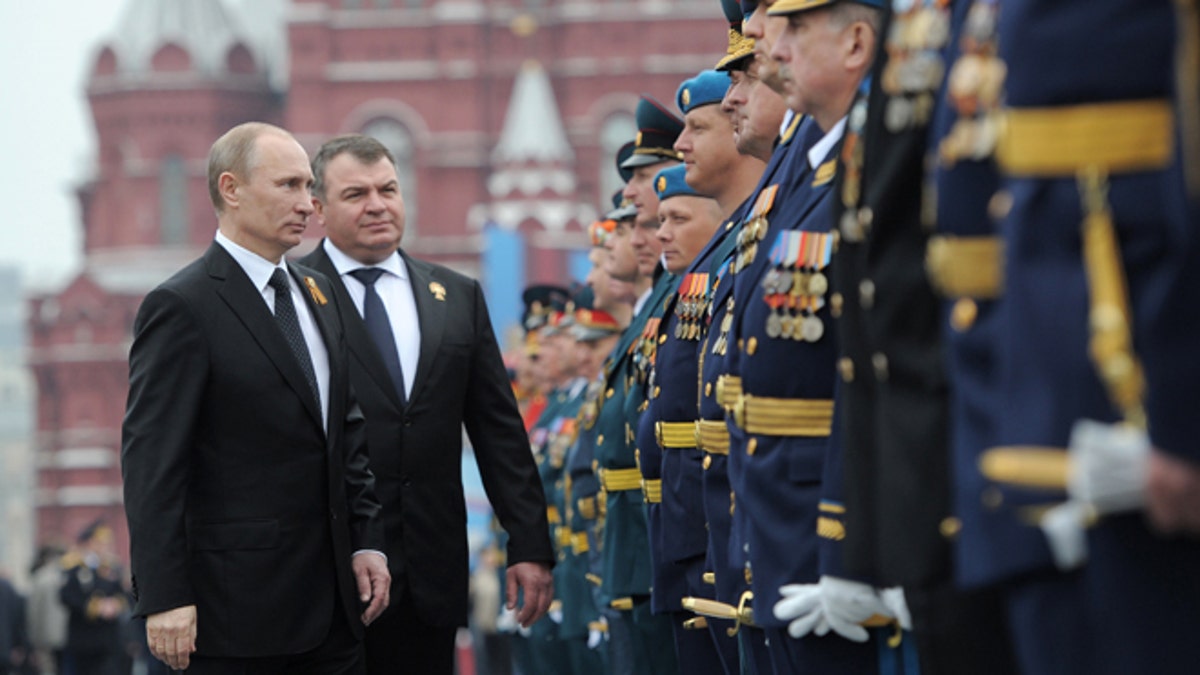
May 9, 2012: Russian President Vladimir Putin, left, and Defense Minister Anatoly Serdyukov, second left, speaks with officers and WWII veterans on the Red Square, after the Victory Day Parade, which commemorates the 1945 defeat of Nazi Germany in Moscow, Russia. (AP)
WASHINGTON – Just days after reclaiming the Russian presidency, Vladimir Putin has canceled his planned visit to the United States, where he'd been scheduled to attend a major economic summit and meet with President Obama.
The White House confirmed in a statement late Wednesday that Putin told Obama on a phone call he'd be sending Prime Minister Dmitry Medvedev in his place. Putin claimed he was too busy finalizing cabinet appointments to make the May 18-19 G-8 Summit at Camp David. Yet the Obama administration had moved the gathering to the Camp David presidential retreat in Maryland from the planned venue in Chicago partly to accommodate Putin.
Whether or not the schedule change marked an intentional snub, the let-down comes less than a week after the nation's military chief of staff warned that Russia would consider preemptive strikes, if a dispute with the United States over a Europe-based missile defense system worsens.
Russia vehemently opposes the planned placement of radars and missile interceptors in Romania and Poland, saying they would undermine Russia's nuclear deterrent. The United States says the system is needed to protect against potential missile attacks by Iran and that the installations could not act against Russian missiles.
Putin's presidential campaign also was decidedly unfriendly toward the U.S. Earlier Wednesday, speaking to thousands of soldiers at the annual Red Square military parade, Putin declared that his country is a force for world security and that Russia will stand up for its positions.
Neither the White House nor the Kremlin had discussed the change in plans until Wednesday, but a White House official said National Security Adviser Tom Donilon was informed of it when he visited Putin and other Russian officials in Moscow last week.
There was no immediate confirmation of the change in plans from the Kremlin.
Putin took power this week, returning after six years to a post he had previously held for two terms. He made sharp criticism of the United States a central theme in his election, but it is not clear whether he will pull back from cooperation with the United States in several areas begun by former President Medvedev.
"The two presidents reiterated their interest in the sustained high-level dialogue that has characterized the reset of relations and the substantial progress of the last three years," since Obama took office, the White House said in a statement outlining the phone call Wednesday.
The statement listed several areas of cooperation such as nuclear security and nonproliferation, the war in Afghanistan and Russian membership in the World Trade Organization. It did not mention whether the leaders discussed areas of disagreement, such as the international response to violence in Syria.
Medvedev, who changed places with his mentor Putin as Russia's prime minister, will fill in for Putin at the G-8 meeting, the White House said. Obama made headlines at his last meeting with Medvedev at a nuclear security summit in South Korea in March, when Obama was overheard saying he would have more flexibility to work with Russia on missile defense after the U.S. presidential election.
Republicans pounced on the remark, saying the president has a hidden agenda that could include concessions to the Russians if he wins re-election.
Russian opposition to U.S. and NATO plans for a missile defense shield in Europe was the subtext of a surprise announcement earlier this spring of a change in venue for the G-8 meeting. The summit was long planned to take place adjacent to a larger summit of NATO leaders in Chicago.
Putin let it be known that he did not want to attend the NATO summit, as Russian leaders sometimes do by invitation, or engage NATO leaders on the missile issue, U.S. and other diplomats said. They spoke on condition of anonymity to discuss sensitive diplomacy. The missile defense plan is on the NATO agenda for Chicago, although most of the summit discussions are likely to center on Afghanistan.
The switch to Camp David was partly an attempt by the U.S. to appear welcoming to Putin, so that he could meet quietly with European and other large powers at the dawn of his presidency without the awkward juxtaposition with NATO and the missile shield issue, the diplomats said.
The White House said Obama and Putin agreed to meet next month on the sidelines of another economic gathering, the larger G-20 summit in Mexico.
The Associated Press contributed to this report.












































